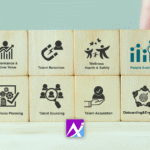As we begin to get back to a more consistent and “normal” work environment, more companies are starting to institute hybrid work environments. In these new work arrangements, employers need to be mindful of the less apparent mental health issues surrounding remote work. Remote and hybrid environments have many benefits, but it is a distinct and new style of work that the company culture and management skills need to account for in their policies and communication.
These policies and communication need to address the potential guilt and embarrassment put on some employees by their managers regarding working from home and increase awareness of its impact on employee mental health. Company policies need to be explicit about hybrid environments and expectations. Clarity gives everyone clear boundaries. Without those boundaries, situations could arise where managers expect more in-person time than what the company is anticipating. They start to create an environment of shame and blame around remote work.
Sometimes the approach by management might be overt, by telling the employee that they really expect them to come in more than they are. However, most methods tend to be more passive-aggressive, saying things as they miss seeing them, wish more people were spending more time in the office or telling them how much better it is when people are all together. While managers might genuinely feel that way, and those sentiments may be coming from a positive place, the issue is the psychological impact that it can have on the employee. It creates a situation where an employee begins to feel awkwardness and/or culpability and is put in a position to feel pressured to go above the scheduled in-office hours. Workers are already struggling with the guilt associated with working from home and added external pressure could put a significant toll on their mental health.
To help avoid these situations, you can set clear company policies and communicate to people managers the best way to have conversations with employees about hybrid work. Empower your managers by giving them knowledge about how to correctly communicate with employees and the effect that their communications can have on their employee’s mental health. Let your people-managers know that it is okay to share their thoughts with employee’s but that they need to create a comfortable area for communication, exposing their own vulnerabilities and personal challenges. It takes time to build trust and a solid relationship with employees. Give your managers communication tools such as talking points, conversation starters, and topics that you recommend they cover with their team. Model the behavior from the top of the organization, and it will let your employees see that you are leading the way in modeling the company culture around hybrid environments.
People Optimization Platform
Tailored Solutions
Helpful Resources
Our Company
Unlock your organization’s full potential with the industry’s premier pre-employment and people optimization platform.
- Contact Our Sales Team | (313) 914-5885
- Contact Customer Support | (313) 914-5885
Experience the power of the AcuMax Index firsthand with a FREE assessment and personalized analysis today!
- © AcuMax Index, 2025. All Rights Reserved.





